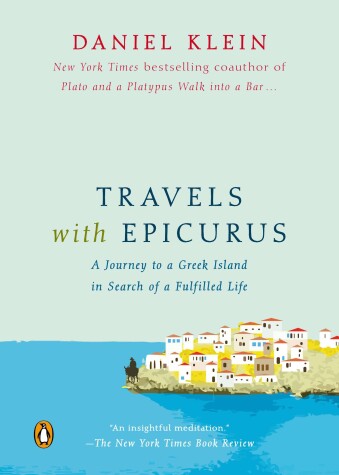
Advice on achieving a fulfilling old age from one of the bestselling authors of Plato and a Platypus Walk into a Bar . . .
After being advised by his dentist to get tooth implants, Daniel Klein decides to stick with his dentures and instead use the money to make a trip to the Greek island Hydra and discover the secrets of aging happily. Drawing on the inspiring lives of his Greek friends and philosophers ranging from Epicurus to Sartre, Klein uncovers the simple pleasures that are available late in life, as well as the refined pleasures that only a mature mind can fully appreciate.
A travel book, a witty and accessible meditation, and an optimistic guide to living well, Travels with Epicurus is a delightful jaunt to the Aegean and through the terrain of old age that only a free spirit like Klein could lead.
I bought this book because recent reading has me suspecting that Epicurus has been rather maligned over the centuries and I wanted to learn more about what his philosophical school was really about. But I didn't want to find out via a dry, academic tome and I wanted to avoid anything that would hurt my brain (see: Heidegger's question, "Why are there things that are rather than nothing?"); I enjoyed Klein's Plato and Platypus Walk Into a Bar so this seemed a perfect fit.
Except that I didn't read the summary close enough. This is a book about Klein's reflections on old age and how he can live the most meaningful, authentic, old age he can. If I use my mom as a benchmark (and I will) then I'm still just slightly on the south side of middle-age, so I'm decidedly not this book's demographic. Also, there's very little about Epicurus here; he and his school of thought are mentioned in passing throughout, but Aristotle, Plato, Kierkegaard, Sartre and Heidegger get more specific play than poor Epicurus.
Still, I got a lot out of this book, even when I completely disagreed with him (and most modern philosophers, come to that). He discusses the paradox inherent in end of life choices, which even at my spring-chicken age I'm deeply interested in. He doesn't offer any answers and ultimately questions whether there are any answers to be had, and that really, for me, is the heart of philosophy.
A worthy read, but one that will be far more relevant (God willing) in a few more decades. Until then I'm still on the lookout for an engaging narrative about poor, misunderstood Epicurus.
Reading updates
-
Started reading
-
1 December, 2016:
Finished reading
-
1 December, 2016:
Reviewed
